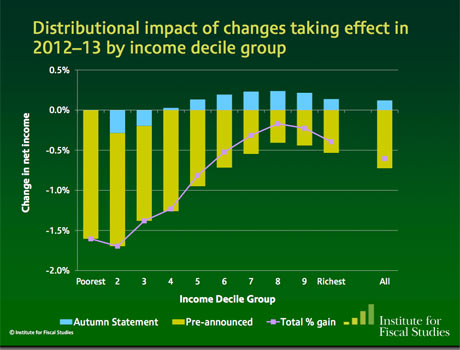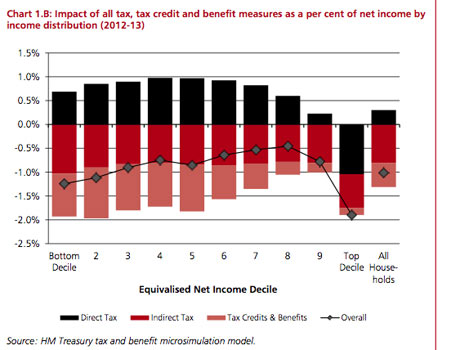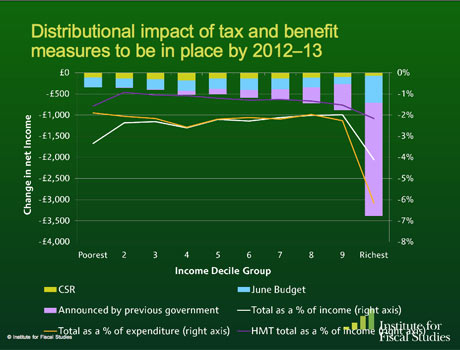
David Cameron and Ed Miliband clashed during prime minister's questions in the Commons today over the evidence about who loses the most from the government's tax and benefit changes. My colleague, Andrew Sparrow, reported the rapid exchange of conflicting statistics:
Ed Miliband asks Cameron to confirm that next year the poorest third of families will lose three times as much as the richest families, as the Institute for Fiscal Studies says.Cameron says that's wrong. If you look at all government policies, the rich pay most - in real terms and proportionally.
Miliband says Cameron is wrong.
The Labour party press office reiterated the point in this tweet:
IFS: bottom 30% losing 3 times as much as richest 30% next year - slide 10 bit.ly/vMTYRI #PMQs
Who is right?
Analysis
Ed Miliband is referring to the following table from the Institute for Fiscal Studies' analysis of the Autumn statement. This clearly shows the impact of the changes taking effect in 2012-13 falling squarely on the poorest.
 Distributional impact of autumn statement 2012-13. Source: IFS.
Distributional impact of autumn statement 2012-13. Source: IFS.
David Cameron is referring to the table below, which is from the Treasury's own distributional analysis of the impacts of the Autumn Statement (pdf) which assesses all the government's tax and benefit changes to date (not just those announced in the statement) and finds that the very richest do indeed pay the most. However, below the richest decile, the impact is almost entirely regressive with the poorest paying more than those in the upper deciles.
 Autumn statement distributional analysis 1.B
Autumn statement distributional analysis 1.B
Both politicians have found the figures that suit their argument. Miliband has opted to use the impact of the changes in 2012-13, which shows a clearly larger burden on the poorest whereas the prime minister uses the accumulated changes, to select the richest 10% and rightly say that they pay the most.
I've just asked Robert Joyce, the IFS economists who compiled Miliband's table, which are the fairest figures to use. He said that the figures cited by both sides are factually correct; which one you choose to use just depends on whether you want to assess the impact of the new changes in 2012-13 (as Miliband does) or the accumulated changes up to that point (as Cameron argued was fairer to do). Then he added this:
Regardless of which stats you use, the things that are driving the large losses for the top group in the Treasury's analysis are mostly things that were announced by Labour they came in during the coalition's reign. If you're specifically interested in measuring the coalition's policies, you don't want to be accounting for that.
Verdict
Cameron and Miliband are both technically right according to their selected statistics and Cameron has the upper hand in terms of citing the statistics that present the broadest picture, rather than the impact of one set of changes. But according to the IFS, he can only make his claim that the very richest pay the most because of Labour's legacy of policy changes that the coalition kept. Below the richest 10% of the population, the impact is regressive. Overall, the poorest will pay the most as a result of the tax and benefit reforms designed by the coalition, rather than the last government.
In an earlier assessment of the impacts of government policy, the IFS separated out the Labour and Conservative originating elements of tax and benefit changes and produced this graph, slide 7, here. It illustrates the point made above that the policies of the last government are largely responsible for the increased impacts on higher earners that Cameron referred to.
 Distributional impact by government. Source: IFS
Distributional impact by government. Source: IFS
A couple of caveats: these don't include the most recent changes announced, but the IFS says that there would make little impact apart from perhaps to exacerbate the trend. This is also in cash terms only, rather than as a proportion of income. James Browne at the IFS has provided me with that data, which I'll add shortly.
Below the line, @TheIndyisBetter makes the point that even if they were Labour policies, the coalition chose to keep them so we shouldn't discount them. Do you agree? Is there a better way of calculating the impact?
Get in touch below the line, email me at polly.curtis@guardian.co.uk or tweet @pollycurtis.
Reading Quran and reflecting over the Quran Is our Duty
Read quran and it will guided us to the true teaching of The Prophet Muhammad (Peace be upon him) he summarized the religion of Islam with this statement: “The Religion is naseehah (sincerity)!” So then Tameem ibn Aws, may Allah be pleased with him, then said, “We asked, ‘To whom?’” He said: “To Allah, HIS BOOK holy quran, His Messenger, the leaders of the people, and their common folk.” [Muslim] so to study the religion people should go to the source of and source of Islam is the quran so learning quran and reading quran with the meaning the quran tafsir and then explore the words of wisdom. And for the Muslims the sincerity that is due to the Book of Allah includes doing the quran recitation, listening to quran along with learning the tajweed rules and reciting it beautifully, letting our kids learn quran learning holy quran tafseer and the reasons for its revelation, affirming that it is the Truth, the perfect Speech of Allah and not part of the creation, honoring it and defending it, abiding by the orders and prohibitions found in it and teaching quran to spread the word or truth and calling to it. So by learning quran education online and reflecting over the Quran online, one fulfills an obligation and is rewarded for that. Upon fulfilling this obligation, the Quran then becomes a proof for him on the Day of Judgment! And that is our second benefit we will take by embracing this Noble Book...

No comments:
Post a Comment